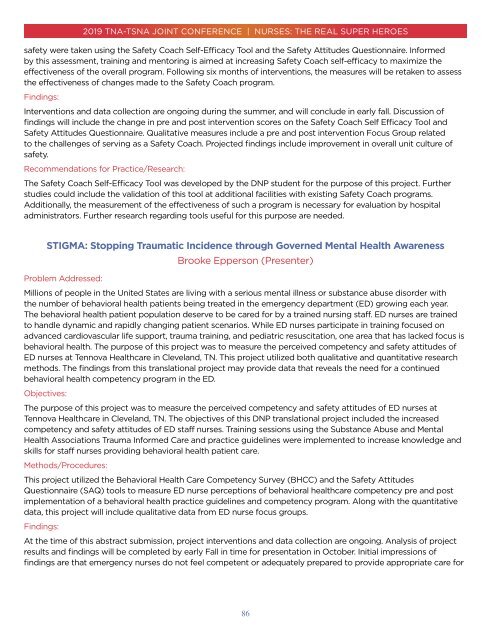2019 Tennessee Nurses Association Book of Reports
You also want an ePaper? Increase the reach of your titles
YUMPU automatically turns print PDFs into web optimized ePapers that Google loves.
<strong>2019</strong> TNA-TSNA JOINT CONFERENCE | NURSES: THE REAL SUPER HEROES<br />
safety were taken using the Safety Coach Self-Efficacy Tool and the Safety Attitudes Questionnaire. Informed<br />
by this assessment, training and mentoring is aimed at increasing Safety Coach self-efficacy to maximize the<br />
effectiveness <strong>of</strong> the overall program. Following six months <strong>of</strong> interventions, the measures will be retaken to assess<br />
the effectiveness <strong>of</strong> changes made to the Safety Coach program.<br />
Findings:<br />
Interventions and data collection are ongoing during the summer, and will conclude in early fall. Discussion <strong>of</strong><br />
findings will include the change in pre and post intervention scores on the Safety Coach Self Efficacy Tool and<br />
Safety Attitudes Questionnaire. Qualitative measures include a pre and post intervention Focus Group related<br />
to the challenges <strong>of</strong> serving as a Safety Coach. Projected findings include improvement in overall unit culture <strong>of</strong><br />
safety.<br />
Recommendations for Practice/Research:<br />
The Safety Coach Self-Efficacy Tool was developed by the DNP student for the purpose <strong>of</strong> this project. Further<br />
studies could include the validation <strong>of</strong> this tool at additional facilities with existing Safety Coach programs.<br />
Additionally, the measurement <strong>of</strong> the effectiveness <strong>of</strong> such a program is necessary for evaluation by hospital<br />
administrators. Further research regarding tools useful for this purpose are needed.<br />
STIGMA: Stopping Traumatic Incidence through Governed Mental Health Awareness<br />
Problem Addressed:<br />
Brooke Epperson (Presenter)<br />
Millions <strong>of</strong> people in the United States are living with a serious mental illness or substance abuse disorder with<br />
the number <strong>of</strong> behavioral health patients being treated in the emergency department (ED) growing each year.<br />
The behavioral health patient population deserve to be cared for by a trained nursing staff. ED nurses are trained<br />
to handle dynamic and rapidly changing patient scenarios. While ED nurses participate in training focused on<br />
advanced cardiovascular life support, trauma training, and pediatric resuscitation, one area that has lacked focus is<br />
behavioral health. The purpose <strong>of</strong> this project was to measure the perceived competency and safety attitudes <strong>of</strong><br />
ED nurses at Tennova Healthcare in Cleveland, TN. This project utilized both qualitative and quantitative research<br />
methods. The findings from this translational project may provide data that reveals the need for a continued<br />
behavioral health competency program in the ED.<br />
Objectives:<br />
The purpose <strong>of</strong> this project was to measure the perceived competency and safety attitudes <strong>of</strong> ED nurses at<br />
Tennova Healthcare in Cleveland, TN. The objectives <strong>of</strong> this DNP translational project included the increased<br />
competency and safety attitudes <strong>of</strong> ED staff nurses. Training sessions using the Substance Abuse and Mental<br />
Health <strong>Association</strong>s Trauma Informed Care and practice guidelines were implemented to increase knowledge and<br />
skills for staff nurses providing behavioral health patient care.<br />
Methods/Procedures:<br />
This project utilized the Behavioral Health Care Competency Survey (BHCC) and the Safety Attitudes<br />
Questionnaire (SAQ) tools to measure ED nurse perceptions <strong>of</strong> behavioral healthcare competency pre and post<br />
implementation <strong>of</strong> a behavioral health practice guidelines and competency program. Along with the quantitative<br />
data, this project will include qualitative data from ED nurse focus groups.<br />
Findings:<br />
At the time <strong>of</strong> this abstract submission, project interventions and data collection are ongoing. Analysis <strong>of</strong> project<br />
results and findings will be completed by early Fall in time for presentation in October. Initial impressions <strong>of</strong><br />
findings are that emergency nurses do not feel competent or adequately prepared to provide appropriate care for<br />
86

















